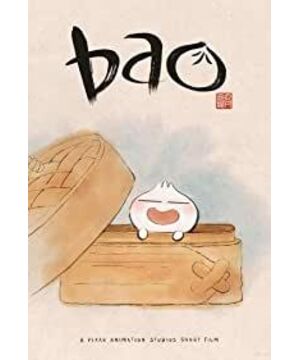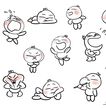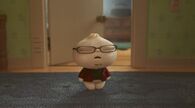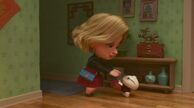It was the first time I saw a Disney short film in a movie theater. The soundtrack was very Chinese. After watching the painting for a long time, I could not be sure that it was made in the United States.
Of course, the scene is the ordinary life of ordinary people, whether it is home furnishings, shopping and cooking, or even Tai Chi in the square and buses. Except for the protagonist whose gender is unknown, the whole thing resonates very well.
But I didn't find it funny from beginning to end. I felt uncomfortable when the little bun tried to get out of the protagonist's sight and was blocked, and then was comforted by a table of sumptuous meals. This discomfort reaches a climax when the protagonist eats the buns that he insists on leaving. This scene was so wonderful and shocking. In retrospect, this scene is touching. After seeing this, I realized what this short film is about.
Only then did it confirm that the protagonist was a mother who was devoted to her child. The whole plot is a demonstration of a common saying: if you hold it in your mouth, you will be afraid of melting, and if you hold it in your hand, you will be afraid of falling. This is a very common situation in traditional families. The father is almost absent from family life, and the mother has the final say in the housekeeping; the mother has a strong desire to control, it is true for the children, and the anxiety about the children leaving is also true. In the sense of growing up, she needs a baby who is always with her. More narrowly, the care of children continues the single-handed arrangement of food, clothing, housing and transportation, and there is no gap in the cultivation of children's independent personality. If a child's decision is not in line with their parents' wishes, they will have to bear their parents' tears and accusations, so Chinese children are not as relaxed and wanton as foreign children.
Speaking of the characters, the embarrassment of the simple and honest son in the film is very vivid. The image of the mother's aunt is a bit exaggerated and suspected of being a stereotype, but it is also realistic. As for the father, there are only three shots in the scene, which is more like a symbol than a living person. It is impossible to achieve three-dimensional and multi-faceted in a few minutes of short film, but the selection of several scenes and the shaping of characters are enough to illustrate the director's profound insights into traditional family relationships and culture. Especially the meaning of Bao Baobao, in addition to the homophony, Baozi in Chinese also means people who dare not resist. As a verb Bao, it can also be understood as comprehensive care and love. Babies dare not express their thoughts in front of their parents, and they have nowhere to say their grievances; mothers will always do the same for their children as they do their babies. These are all very memorable points.
In the film, the mother fell to the ground crying after swallowing the buns, but my attention was all on the buns that were swallowed, and I even hoped that the buns could make a scene like Sun Wukong. This subconscious behavior of mother is clearly saying, I love you! I love you so much and you still want to leave me, then I would rather eat you, eat you in my stomach, and never part! This motivation is not justified by the fact that the protagonist is a real food bun, on the contrary, it is more terrible. For Chinese parents, what exactly is a child? Is it an accessory that is entirely shaped by the parent to prove the existence of the parent?
More and more, I feel that traditional culture is worth learning from, and there are not many suitable for today's era. For example, the parent-child relationship, the individual is independent and free, is a completely Western concept. Traditionally, there is only the head of the family, and it only talks about "parents who are born and received by the body". Parents who have great kindness to their children only talk about "Twenty-Four Filial Piety", which requires their children to be obedient and filial. Chinese parents and children have never been equal. Children are naturally taught to feel indebted, and to repay their kindness is a heavy emotional burden. When faced with separation, parents are more fearful and anxious than their children, and they are more likely to maintain their authoritative identity.
Some people think that the values conveyed by the film are not clear, or that it is just a stereotype of Chinese Americans by white people. As a native Chinese, I think this film is not promoting a value, but an objective expression and statement of a common phenomenon, and the cultural core of its display cannot be more accurate. There are many people around me who believe that their parents are not far away, and there are many people who have been interfered with from majors to occupations to marriage and even the upbringing of children. After a woman becomes a mother, taking motherhood as the first or even only social role is still recognized by the mainstream society.
If parents are unwilling to step down from the altar of parents, accept being opposed, refuted and left, accepting that parents are only part of their personal identity, and are not moved by self-sacrifice, the parent-child relationship will never get out of the heavy suffocation.
Food runs throughout the film, the couple eats, and the baby appears. Mother's love is all about the stove by the side of the pot. The fond memory of mother and son is eating a box of snacks on the way home. The mother prevented the child from knowing that the child was unhappy, and the compensation measure was to cook a large table of meals. In the end, the reconciliation and happy ending of the two also returned to share the food together. Food has such an unaware importance in the hearts of Chinese people. It is the family who can sit down to eat, and even if the family is unhappy, they have to eat at the same table. It is a pity that Chinese parents' standard for their children to eat well is mainly based on quantity.
A short comment said that when the foreign screening saw the mother eating the buns, they all laughed. I think of David I met in Shanghai. He was happy when he talked about the crowded blind date corner. He thought it was too interesting for Chinese parents to arrange their children, like a supermarket. When I, a Chinese who joked about blind date corners on a daily basis, knew for the first time that foreigners knew blind date corners, I was very ashamed and my face was inexplicably hot. The director used this scene very powerfully to poke the laughter of foreigners and the tears of Chinese people. The contrast between east and west is clear at a glance.
It is true that domestic values are in a period of sudden change and confusion. Parents and children are exploring the boundaries and implementation of equality, freedom and democracy. There are more and more enlightened parents who no longer revolve around their children. Inert, shouting that my life is my master, and calling on Chinese parents who are responsible for material things. And those children who are hard-hearted and shoulder the responsibility of life have stepped out of the control of their parents and walked out of an upright life. I hope that our next generation will not be speechless when their mother eats buns and laugh when they see this short film.
I still don't feel that the film is to cater to white people and maliciously mock traditional Chinese culture. The pain and shame I can relate to is because I have seen many family conflicts and tragedies stem from the vague definition of the parent-child relationship. Thinking about it carefully, this short film is not suitable to be placed in front of The Incredibles, at least it directly affected my perception of The Incredibles.
View more about Bao reviews







